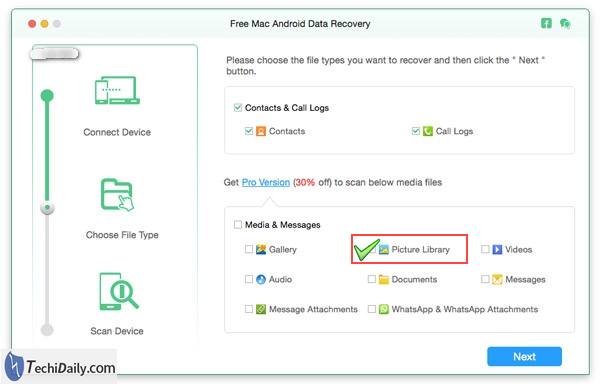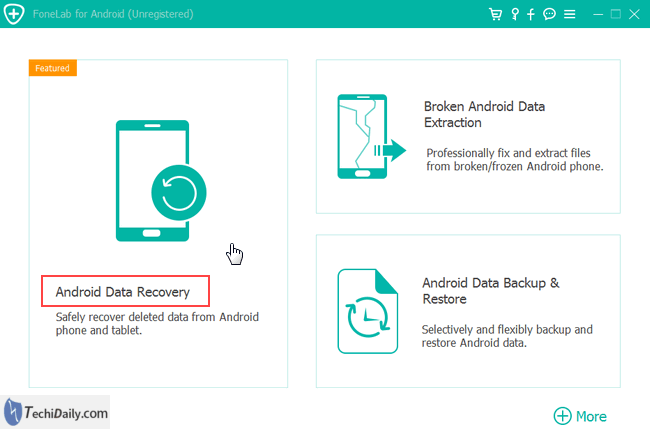Undelete lost photos from Vivo S17.


As a matter of facts, a photo is marked as blank after being deleted. The deleted item just becomes inaccessible and invisible. However, it would be completely erased if new data are written in and take place of it.
Therefore, you must stop adding new photos to your cell phone if data loss happens. There are ways to retrieve a deleted image on Vivo S17 either from internal storage or SD card via Gmail or Android Data Recovery.
When talking about the recovery of deleted photos or any other data that matters to you, Android Recovery is always a good option. It is designed to help users restore deleted or formatted data from any Android phone. This tool brings a simple and safe way to recover lost photos. Not just photos, it will help with recover text messages, WhatsApp messages, audio, video and other media files. Also, the important feature to point out about this app is that you can preview the scanned files and can select only those files that you wish to recover.
- Part 1: Undelete lost photos from Vivo S17. (on macOS)
- Part 2: Undelete lost photos from Vivo S17. (on Windows)
Step 1: Download and launch the Android Data Recovery on Mac
Download and install the Android Data Recovery on your Mac computer, when you open it, a dialog box will pop up to remind you whether to register, purchase or free try.

Step 2: Connection
Run this powerful Android data recovering software on your Mac computer, and then connect your Vivo S17 device to computer via the USB cable. The program will detect your device automatically.
Step 3: Enable USB debugging.
Android Data Recovery will prompt you to enable USB debugging on your Vivo S17, if you don’t open the debugging mode. The program will detect the version of your Vivo S17 automatically and give you the instruction of opening the USB debugging mode on your Vivo S17. After finishing the operations on your device, click “OK” button.
Step 4: Select the photos you want to recover.
After connection, all file types on your Vivo S17 will be showed in the interface. Choose the file types you want to recover, such as contacts, messages, messages attachments, call logs, photos, gallery, picture library, videos, audios and other documents. Check the file types you want to recover and click Next. The program will scan your device automatically.
Step 5: click “Recover” button to complete recovering Vivo S17’s photos
When the scanning is finished, all types of files will be listed in categories on the left control. You are allowed to check the detailed information of each data. Preview and select the data you want to recover, and then click “Recover” button to complete recovering process.
Step 1: Download and launch the Android Data Recovery
Download and install the Android Data Recovery on your Windows computer.
Step 2: Connection
Connect your Vivo S17 device to your Windows computer via the USB cable. Wait for seconds before the device is detected. Install the device driver on your computer if it hasn’t been installed.
Step 3: Enable USB debugging.
Allow USB debugging when your Android prompts you of USB debugging permission. After finishing the operations on your Vivo S17 device, click “OK” button.
Step 4: Preview and recover the Vivo S17’s lost photos.
Soon, all Android available files will be classified into category on the left. You can toggle the button of “Only display the deleted item(s)” to “On”, so that you can quickly find the wanted Android file. Click “Recover” button and choose a destination folder to recover files. Within seconds, you can navigate to the file folder and check your deleted files from Vivo S17.
The above steps are the whole process to retrieve deleted photos from Vivo S17 without backup with the help of Android Data Recovery. In any case, prevention is the best protection.
Also read:
- [Updated] 2024 Approved A-List iPhone Video Recording Hacks
- [Updated] 2024 Approved The Complete Guide to Netflix Screen Capture - Discover Six Efficient Ways on macOS
- [Updated] In 2024, Unlock Viewers Essential Guide to Fantastic Template-Based YT Desc Writing
- [Updated] Task Mastery Top Picks for Efficient Calendar Management in FB for 2024
- 2024 Approved How to Optimize Facebook SEO with 10 Surefire Ways
- AddROM Bypass An Android Tool to Unlock FRP Lock Screen For your Lava Blaze 2 5G
- Different Methods for Resetting Xiaomi Redmi 13C Phones with Screen Locked and Not | Dr.fone
- Emblem of Success Create & Tailor Professional Logos with Free Models
- Full Guide to Hard Reset Your Infinix Smart 8 HD | Dr.fone
- How to Downgrade Apple iPhone XS without Losing Anything? | Dr.fone
- How to Fix It Infinix Smart 8 Pro Wont Turn On | Dr.fone
- How To Transfer Data From Apple iPhone 14 To Other iPhone 12 Pro devices? | Dr.fone
- Samsung Bypass Tools to Bypass Lock Screen(Samsung Galaxy A15 5G)
- Simple ways to get lost messages back from Nubia Z50S Pro
- Undelete lost photos from Redmi A2+.
- Updated From Ordinary to Amazing The Ultimate Video Enhancement Tool
- Why are your photos lost from iPhone SE? | Stellar
- Title: Undelete lost photos from Vivo S17.
- Author: Ian
- Created at : 2024-11-26 17:16:26
- Updated at : 2024-12-02 18:37:10
- Link: https://techidaily.com/undelete-lost-photos-from-vivo-s17-by-fonelab-android-recover-photos/
- License: This work is licensed under CC BY-NC-SA 4.0.